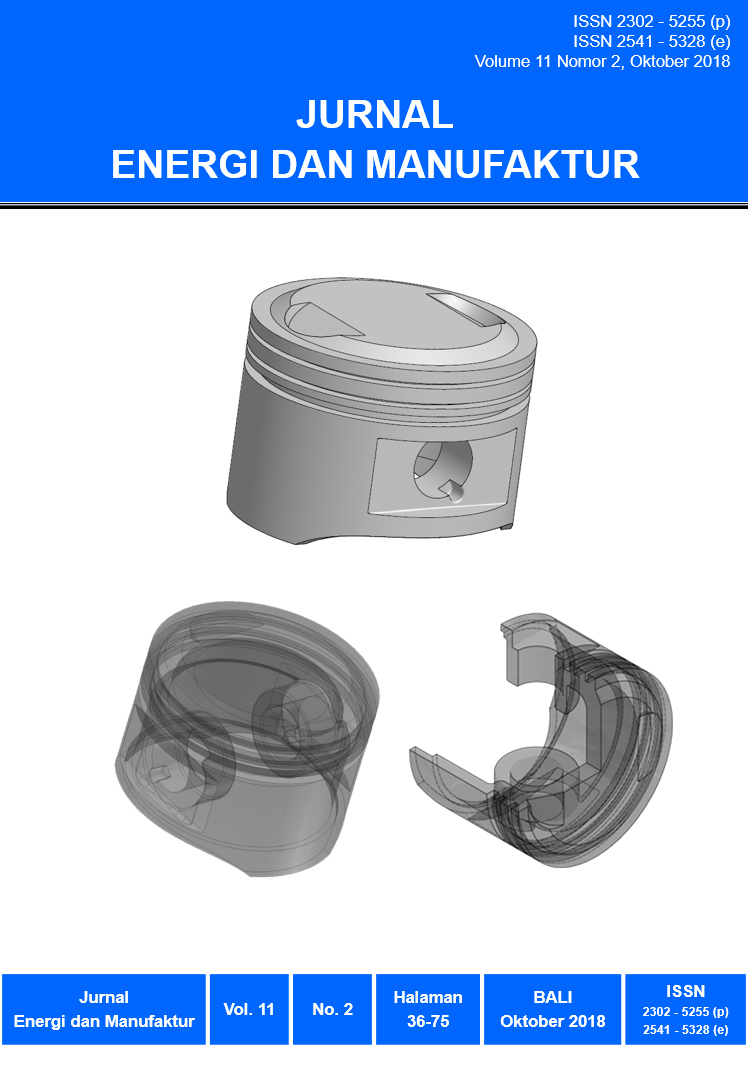Proses Pembentukan Gasket berlapis dengan Metode Elemen Hingga
Abstract
Perkembangan metode elemen hingga memberikan kemudahan bagi para peneliti untuk memprediksi proses dan hasil forming suatu produk sehingga kegagalan bisa dicegah lebih awal dan biaya karena cacat produk bisa dihindari. Pada penelitian ini, proses forming metal gasket three-layer bentuk bergelombang akan di investigasi dengan analisa simulasi yang menggunakan metode elemen hingga. Kesesuaian bentuk produk gasket dengan cetakan mempengaruhi performance gasket tersebut saat proses tightening. Dimensi cetakan gasket menggunakan cetakan gasket 400MPa-mode dengan variasi ketebalan surface layer. Base material menggunakan SUS304 dan surface layer menggunakan ratio modulus elastis 0.1 dan 0.5. Hasil simulasi menunjukkan bahwa gasket forming tidak memenuhi cetakan dan pada bagian puncak gelombang gasket terjadi lekukan. Besarnya lekukan pada puncak gelombang menurun dengan naiknya ketebalan surface layer.
The development of finite element methods help the researchers to predict the process and the result of product forming so that failure can be prevented earlier and costs due to product defects can be avoided. In this study, the process of forming metal gaskets of corrugated three-layer forms will be investigated by simulation analysis using finite element method. The suitability of the shape of the gasket product with the mold affects the performance of the gasket during the tightening process. Gasket mold dimensions use 400MPa-mode gasket molds with surface layer thickness variations. Base material using SUS304 and surface layer using Aluminum. The simulation results show that the forming gasket did not fill the mold and at the peak of the gasket convex occurs indentation. The amount of indentation at the convex of the wave decreases with the increase in surface layer thickness.
Downloads
References
[2] S. Haruyama, M.A. Choiron, K. Kaminishi, “A Study of Design Standard and Performance Evaluation on New Metallic Gasket”, Proceeding of the 2nd International Symposium on Digital Manufacturing, Wuhan China, 2009, pp. 107-113.
[3] M.A. Choiron, S. Haruyama, K. Kaminishi, “Simulation and Experimentation on the Contact Width of New Metal Gasket for Asbestos Substitution”, International Journal of Aerospace and Mechanical Engineering, Vol. 5, No. 4, 2011, pp. 283-287.
[4] D. Nurhadiyanto, M.A. Choiron, S. Haruyama, K. Kaminishi, “Optimization of New 25A-size Metal Gasket Design Based on Contact Width Considering Forming and Contact Stress Effect,” International Journal of Mechanical and Aerospace Engineering, Vol. 6, 2012, pp. 343-347.
[5] S. Haruyama, D. Nurhadiyanto, M.A. Choiron, K. Kaminishi, “Influence of surface roughness on leakage of new Metal Gasket”, International Journal of Pressure Vessels and Piping, 111-112, 2013, pp. 146-154.
[6] S. Haruyama, D. Nurhadiyanto, K. Kaminishi, “Contact Width Analysis of Corrugated Metal Gasket based on Surface Roughness, Advanced Materials Research, Vol. 856, 2014, pp. 92-97.
[7] S. Haruyama, D. Nurhadiyanto, K. Kaminishi., I M.G. Karohika., Mujiono, “Contact Stress and Contact Width Analysis of Corrugated Metal Gasket”, Applied Mechanics and Materials, Vols. 799-800, 2015, pp. 765-769.
[8] S. Haruyama, , I M.G. Karohika, A. Sato, D. Nurhadiyanto, K. Kaminishi, , “Development of 25A-Size Three-Layer Metal Gasket by Using FEM Simulation”, International Journal of Mechanical Aerospace, Industrial, Mechatronic and Manufacturing Engineering, Vol:10, No:3, 2016, pp.555-561.
[9] MSC Marc 2014, User Manual.

This work is licensed under a Creative Commons Attribution-NonCommercial-ShareAlike 4.0 International License.









